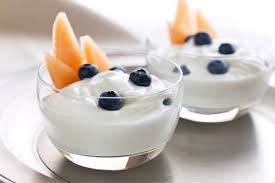With protein, calcium and probiotics, yogurt is one of the healthiest foods out there. But not all yogurts are created equal. Check out how the various types stack up.
Try traditional yogurt.
The yogurt you grew up eating is unstrained (still contains whey), which means it’s thinner than Greek and Icelandic styles. Nutrition-wise, it has more calcium and natural milk sugar than other varieties.
Get more protein with Greek yogurt.
This thick, strained yogurt now makes up more than a third of all yogurt sales in the United States. Straining removes some lactose, calcium, milk sugars and minerals but results in a higher protein content. One cup of Greek yogurt can have up to 20 grams; traditional yogurt has 11-13 grams.
For the most protein-rich choice, try Icelandic yogurt.
This is the thickest of all varieties: 1 cup of this strained yogurt is typically made with 4 cups of milk. Because of that, Icelandic yogurt often has the highest protein content. It also has the longest incubation process, so it’s the tartest of all varieties and has the lowest amount of milk sugar.
If creamy is your thing, choose Australian yogurt.
Creamy and unstrained, this yogurt is commonly made with whole milk so will be higher in fat than the traditional variety, but otheFor the most protein-rich choice, try Icelandic yogurt.rwise has a similar nutritional profile.
Don’t do dairy? You have options.
Yogurt can be made from nondairy milks, such as coconut, soy and almond. For the same health benefits as regular yogurt, look for calcium on the Nutrition Facts label—a serving should provide at least 15 percent of your daily calcium dose. And also make sure the yogurt has been cultured—you should see probiotics listed on the label.

Check these three things.
- Probiotics: Look for the Live & Active Cultures seal on the label of dairy and nondairy yogurts. It means that your choice contains the highest amount of probiotics. No seal? L. bulgaricus and S. thermophilus should be listed as ingredients.
- Sugars: Plain yogurt with 9 g or less of natural sugar per serving is the healthiest choice. For flavored yogurts, opt for ones with less than 15 g of sugar. Anything higher than 17 g has the same sugar content as two fun-size Snickers bars! That’s fine if you’re choosing yogurt as a treat over something with more sugar—such as ice cream—but it’s not a great choice for breakfast.
- Fat: Full-fat yogurts can be a creamier, healthy choice; just figure their higher saturated fat and calories into your overall daily saturated fat intake, which should be less than 7 percent of your total daily calories. Full-fat yogurts often keep you feeling fuller for longer, but be sure to dial back fat and calories elsewhere if this is what you choose.
